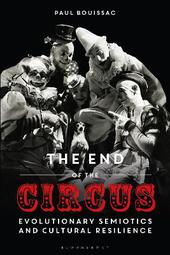
|
The End of the Circus: Evolutionary Semiotics and Cultural Resilience
Hardback
Main Details
| Title |
The End of the Circus: Evolutionary Semiotics and Cultural Resilience
|
| Authors and Contributors |
By (author) Professor Emeritus Paul Bouissac
|
| Physical Properties |
| Format:Hardback | | Pages:264 | | Dimensions(mm): Height 234,Width 156 |
|
| Category/Genre | Sociolinguistics |
|---|
| ISBN/Barcode |
9781350166493
|
| Classifications | Dewey:791.3 |
|---|
| Audience | | Tertiary Education (US: College) | |
|---|
| Illustrations |
30 bw illus
|
|
Publishing Details |
| Publisher |
Bloomsbury Publishing PLC
|
| Imprint |
Bloomsbury Academic
|
| Publication Date |
9 September 2021 |
| Publication Country |
United Kingdom
|
Description
This book analyses two features of the traditional circus that have come under increasing attack since the mid-20th century: the use of wild animals in performance and the act of clowning. Positioning this socio-cultural change within the broader perspective of evolutionary semiotics, renowned circus expert Paul Bouissac examines the decline of the traditional circus and its transformation into a purely acrobatic spectacle. The End of the Circus draws on Bouissac's extensive ethnographic research, including previously unpublished material on the training of wild animals and clown make-up, to chart the origins of the circus in Gypsy culture and the drastic change in contemporary Western attitudes on ethical grounds. It scrutinizes the emergence of the new form of circus, with its focus on acrobatics and the meaning of the body, showing how acrobatic techniques have been appropriated from traditional Gypsy heritage and brought into the fold of mainstream popular entertainment. Questioning the survival of the new circus and the likely resurgence of its traditional forms, this book showcases Bouissac's innovative approach to semiotics and marks the culmination of his ground-breaking work on the circus.
Author Biography
Paul Bouissac is Professor Emeritus at Victoria College, University of Toronto, Canada. He is a world renowned figure in semiotics and a pioneer of circus studies.
ReviewsThis is a rigorous yet heart-felt account of the demise of the travelling circus. Professor Bouissac argues that both its former popularity and present opprobrium reflect the ways that sedentary societies have seen themselves, their travelling others and their relationship with nature. No-one could tell this tale better. * Ron Beadle, Professor of Organization and Business Ethics, Northumbria University, UK * One of the first academicians to explore the substance beneath the glamorous facade, Paul has now produced a volume that reflects his love and knowledge of The Circus and it's participants, in addition to his previous works it delivers a lasting and worthy testament to a noble profession. * David Koenyoet, Clown, Circus writer, UK * The circus can have no better advocate than Paul Bouissac, his knowledge of its history and role in popular culture matched, indeed quickened, by his own experience of having once been part of it. That combination allows him to explain what lies behind the enchantment without ever dispelling its magic. In this, his latest book he describes the Romany contribution to what became the modern circus, a contribution seldom acknowledged, not least by circus folk themselves. Long overdue, too, is his refutation of the claim that animals in circuses are routinely, almost necessarily, mistreated. Yes, abuses have from time to time occurred but so, far more often, have they done elsewhere. And indeed still do, largely overlooked, now that the last trick pony's quit the sawdust ring. Happily, this book recreates for us the joy that was - and is - the circus. In doing so it manages somehow to make it more joyful still. * David Conway, Author of Magic: My Life In More Worlds Than One *
|